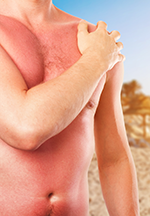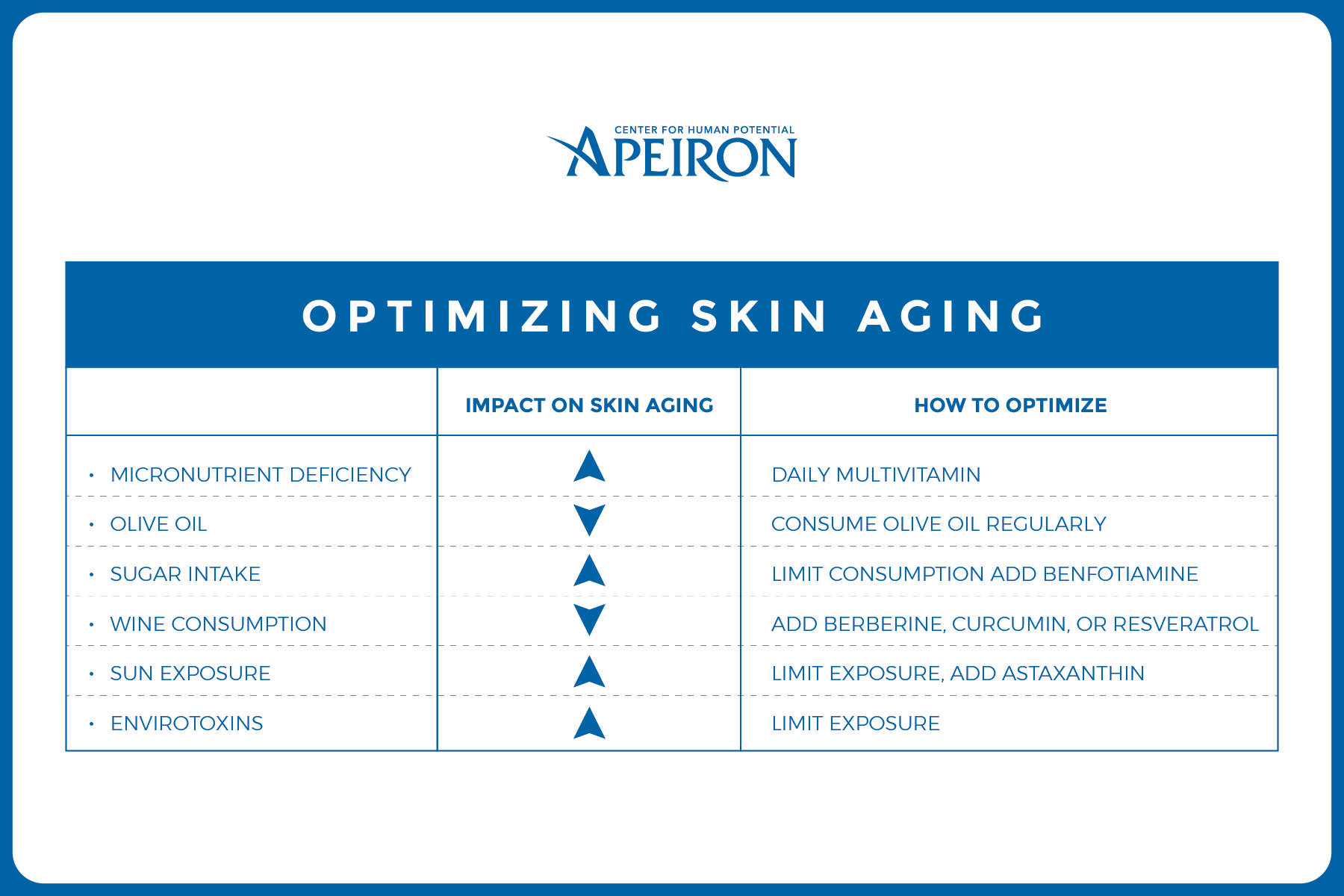What if you could upgrade your skin health without needing to resort to invasive surgeries or spending thousands of dollars? The saying beauty is only skin deep may need to be revised in light of modern medicine. Science now shows how we can influence the health and appearance of our skin, hair, weight, and overall health based on epigenetics – the lifestyle impacts on our gene expressions.
Micronutrients
Premature skin aging and natural aging of skin are intimately connected to inflammation. The process of premature skin aging is known as inflammaging where collagen and elastin breakdown and the skin becomes dry, inelastic, and wrinkles develop.
Micronutrients help reduce aging of the skin by altering patterns of gene expression. Histone H4K16ac increases and H3KPme methylation decreases in the presence of these nutrients which turns down this process of inflammation and improves the body’s response to oxidative stress leading to decreased impact of skin aging. This is one example of nutrigenomics where intake of certain nutrients changes the expression of inflammatory genes into a more favorable outcome.
Excellent sources of these micronutrients and essential phytochemicals are whole fruits and vegetables. The foods highest in phytochemicals are red, orange, and green fruits and vegetables. Ingesting these nutrients provides more substantial benefits than through topical use in skin care products. A good multivitamin is another great source especially since many of our currently available fruits and vegetables are deficient in many nutrients.
Enjoy Olive Oil
Olive oil is preferred over butter as a healthy source of fat. Olive oil serves as an antioxidant and activates proactive pathways in epigenetic repair systems. This makes olive oil a dual fold health and beauty aid as it both protects from future damage and heals past damage.
Olive oil can be used topically or consumed. When consumed, olive oil provides healthy oleic oils which are monounsaturated oils responsible for reducing inflammation and fighting cancer cells. As a topical treatment, olive oil offers rejuvenation to damaged and dry skin cells and promotes increased moisture levels and new cell growth. Click To Tweet
“Modifications to plasma lipids and lipoprotein patterns, effects on membrane composition and fluidity of blood cells, inhibition of coagulation, improvement in glucose homeostasis and blood pressure, and attenuation of inflammation and oxidative states in fasting conditions, are some of the biological effects that support the cardioprevention role of oleic acid.”
2016 International Union of Biochemistry and Molecular Biology Volume 43, Number 1, January/February 2017, Pages 17–41
In addition, olive oil is a potent nutrigenomic food, essentially a living food that interacts with our DNA expression. The monounsaturated fat along with the mix of carotenoids, chlorophylls, phenolic compounds, and tocopherols have a significant positive impact on the way our genes are expressed, especially those that impact skin health.
Limit Sugar Intake
Refined or simple sugar can be found in most processed foods. Diets high in sugar can increase the risk of cancer, obesity, and diabetes. A dangerous side effect of high sugar diets includes shortened telomeres which are associated with aging. The higher the sugar consumptions, the shorter the telomere length.
Simple sugars should be limited or avoided. These sugars result in insulin spikes and can be found in white sugar, processed foods, and simple liquid sugars like corn-syrup. Instead look for natural and complex sugar or carbohydrates from plant-based sources. Sugars from plant-based sources have a slower uptake in the body which produces a more stable blood glucose level. Healthy sugar alternatives for baking include stevia, honey, and dates.
Having even slightly elevated blood sugar levels can lead to a process called glycation – where sugar molecules become stuck to proteins in your body. Click To TweetThis can cause your proteins to fold over like Velcro and alter the protein structures making them dysfunctional. This eventually leads to AGES (advanced glycation end-products) which build up in the body and accelerate aging. Age spots on the skin are examples of AGES. The supplement benfotiamine has been shown to reduce the formation of AGES.
Sip on Wine
Red wine contains resveratrol which is a compound that can relieve inflammation and reverse signs of aging in the skin. Resveratrol stimulates SIRT1 gene expression and extracellular proteins which help promote healthy collagen levels, skin elasticity, and protect cells from stress-related damage.
The health benefits of red wine can be seen when consumed in moderation. The suggested amount is one glass of wine a day. More than one glass of wine, over the long term, can have detrimental effects on weight and organ health.
Although I do enjoy wine, a recent study suggests that there is no true beneficial level of consumption when we weigh the risks and benefits. A better option is to work with your epigenetic expression using nutrigenomic supplementation. Studies demonstrate that berberine, curcumin and resveratrol are highly effective at upregulating expression of the SIRT1 gene expression. In our clinical experience berberine and curcumin are the most effective.
Sun Exposure
Unprotected sun exposure leads to photoaging where the own ages faster, develops wrinkles, and age spots. Photoaging is a result of the ultraviolet radiation causing DNA methylation. As we age our bodies become more sensitive to the impact of the sun, so protecting the skin remains vital as we age.
Covering exposed skin during prolonged sun exposure can dramatically reduce the adverse effect of ultraviolet radiation on DNA. The down side of reducing the sun exposure is the loss of vitamin D conversion and vitamin D deficiency can create accelerated skin aging as well. Internal mitigation strategies such as astaxanthin supplementation are quite beneficial to reduce skin damage from sun exposure. Sunscreen should be used with caution because it can potentially impact epigenetic expression through endocrine disruption.


Environmental Toxins
In our modern world there are toxins all around us from the air we breathe to the products used to clean our home and of course, the things we put on our skin. Exposure to pollutants and environmental toxins causes DNA methylation which can increase the risk for inflammation and shorten telomere length. As these genetic variations occur in gene expression, the skin prematurely ages.
Some toxins that are easy to reduce exposure to include cigarette smoke, pesticides, and cleaning products. Smoking causes the skin to prematurely age at a rapid rate, but quitting and avoiding cigarette smoke can result in a reversal of the damage over time. Switching to organic fruits and vegetables reduces exposure to harsh chemicals used to treat plants and avoids GMOs which could also cause DNA variations. Finally, there are ample natural cleaning products on the market which clean just as effectively in a manner safer for you and the environment.
One simple lifestyle change pertains to washing. When we use soap every day, it washes away beneficial and healthy skin oils. For healthy vibrant skin, it is important to not use soap on our skin and body every day. Washing the armpits, genitals and feet with soap daily is fine, limit the use of soap on face, skin, and hair to only a couple of times per week in order to maintain the healthy skin oils.
Conclusions
Beauty is not skin deep. It goes beyond outer appearance and includes the health of our bodies and minds. Nothing is more beautiful than a happy, healthy person who is actively engaged in their social circle. As you make the effort to improve the beauty of your DNA, you will reap the rewards of glowing from the inside out.
An epigenetic coach can assist you in getting a personal DNA profile, so you will know where your body could use more tender loving care. Once you are informed on your genetic profile, you can work to tailor your diet, exercise, and lifestyle to maximize your health and live a thriving life.








